Angela Ackerman's Blog: Writers Helping Writers, page 63
July 6, 2021
Street Team & Book Review Call for the Upcoming Conflict Thesaurus
Guys, a new book is on its way in just a few months (The Conflict Thesaurus) and so we thought we’d reach out a bit early to see who might be interested in joining our Street Team this year.
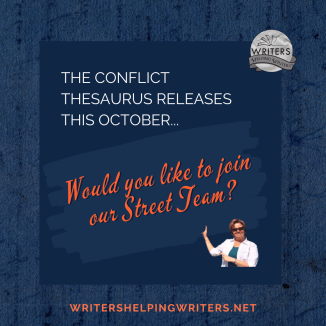
This is the first volume in a two-volume set, as there are too many ingenious ways to push characters to their limits to fit in one book. Plus, using a variety of conflict keeps our writing fresh and ensures readers are locked on the page.
I’m not going to lie, dreaming up meaningful ways to torture characters was maybe just a little therapeutic after all the mental challenges of Covid. We can’t wait for you to see this one!
Launching a book is a team effort, and you guys have been so good to us about getting the word out. We’re hoping you might be willing to help again. Don’t worry, we won’t be asking for much over summer – you guys need this time to enjoy life and decompress. But Arcs will be ready soon, and we’ll be giving out 50 of these digital bad boys to make sure reviews as in place at launch so writers have the information they need to decide if this guide is one they need.
Right now we just want to get a list going of those who might be interested in the Street Team so we can get in touch a bit later, and to also find lovely folks who might like some summer reading to book reviewers (and possibly typo hunters). We have an editor and proofreader, but you know how it is…typos and goofs can slip through. 
And THANK YOU! You guys are terrific.
The post Street Team & Book Review Call for the Upcoming Conflict Thesaurus appeared first on WRITERS HELPING WRITERS��.
July 2, 2021
A Dual Holiday Deal: 40% Off One Stop for Writers
On the 30th of June, I went for my second Covid shot, knowing full well I’d probably end up with some after affects the next day (as that’s what happened with my first shot). And, well, I wasn’t wrong. Instead of celebrating Canada Day, your pal Angela was holed up under a pile of blankets, not at all bothered by the sweltering heat for once because she was all shivery and flu ache-y.
But hurray, I’m fully vaccinated!

Now that I’m feeling better, it’s time to do something about that missed Canada Day. And heck, Independence Day is almost here too, which is Becca’s corner of the world, and many of yours as well. So, why not split the difference and celebrate them both now, right?
Write Stronger Stories…and Save 40%As many of you know, Becca and co-founded One Stop for Writers, a storyteller’s portal to ingeniously helpful tools and resources. For example, if you like our thesaurus books, the THESAURUS database is right up your alley, containing 15 descriptive topics! So to celebrate our neighboring country holidays, we’ve got a sweet discount code for you: 40% off a 6-month subscription at One Stop for Writers.
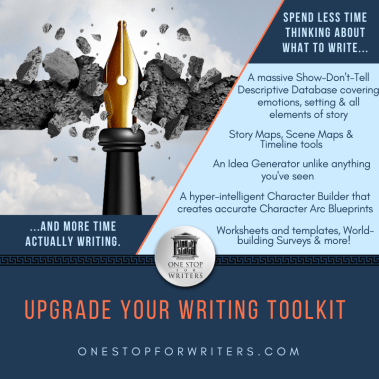
Just sign up or sign in, and then enter the one-time code HAPPY4TH in the coupon code box when you choose the 6-month plan.
HAPPY4THWe’ve helped thousands of writers craft stronger stories, and we’d love to help you too. So if you’re ready to finish that novel, see your skills grow, and most of all, for writing to become much, much easier, come check us out. We have a walkthrough video here.
(Psst! This code will expire at the end of the day July 4th, so don’t delay.)
And happy Canada Day & 4th of July!
The post A Dual Holiday Deal: 40% Off One Stop for Writers appeared first on WRITERS HELPING WRITERS��.
July 1, 2021
Procrastination vs. Real Writing Crisis: How to Tell the Difference

by Colleen M. Story
You���re not writing. It���s been a few weeks now, and your regular writing routine has gone out the window.
Are you struggling with a legitimate writing crisis, or are you just procrastinating?
It���s not always easy to tell the difference. If you���re not writing and you���re not sure why, ask yourself these questions to find out.
1. Are you going through a real-life crisis?If you’re going through a crisis like a serious illness, loss of a job, death in the family, or divorce, it’s completely understandable if you’re not writing. Trying to navigate these sorts of situations can take all your reserves to the point where you have nothing left for your story.

Action steps: Give yourself a set amount of time to recover. Choose a date when you���ll get back into your writing and mark it on your calendar. When that date arrives, start small���write for 10 minutes a day, for example, until you get back into the habit.
Another option is to switch gears with your writing and use it to help yourself through the crisis. Instead of working on your story, journal about what���s happening in your life.
Release your difficult emotions onto the page. Research shows that expressing your emotions through writing can help you recover faster from trauma and clear your thoughts so that you can more quickly find solutions.
2. Are you struggling with your story?Ask yourself when you stopped your regular writing practice. Were you struggling with your story at the time? Perhaps you were in the middle of your novel and got stuck. Or maybe you realized that your plot was going off the rails and you didn���t know how to get it back.

When we come up against a wall while writing and don���t know how to get over it, procrastination can set in. Instead of seeing your story as something you enjoy working on, you begin to see it as an obstacle, which you naturally want to avoid.
Action steps: First, don���t rush to judgment on your story. It���s easy for writers to decide that they���re having trouble because their story isn���t any good. But this is almost always the wrong conclusion.
Instead, what���s missing is skill. Imagine if you gave your struggling story to a master writer you admire. Would that writer be able to fix it? If your answer is ���yes��� (which is most often the case), you need to learn more about storytelling so you can find the solution you need. Research writing books that may help, along with courses and workshops, and take action to improve your skills.
Want a shortcut to valuable writing help? Scroll down to the i need help with… section on the home page.

You can also invest in yourself by hiring an editor or book doctor. Few authors reach their full potential without help. Give yourself every possible chance by working with a professional. When you get that breakthrough in your story, you’ll be glad you did.
3. Are your energy levels low?Most of us have to fit our writing in around our day jobs and family responsibilities, which means that the bulk of our energy is often depleted by the time we sit down and write.
We need that extra energy if we are to stick to a regular writing practice. If you don���t have it, you���re probably procrastinating on your writing simply because you feel too tired.

Action steps: Think of yourself as an athlete. If you are to keep up a regular writing practice, you need to get 7-8 hours of sleep per night, exercise every day (a daily walk is great), eat a healthy diet, and practice a daily stress-relieving activity like meditation, yoga, journaling, or crafting.
Next, write at high-energy times of the day. For most writers, first thing in the morning is best. Even if you can fit in only 20 minutes, getting that writing time in before you do anything else guarantees that a) you get it done, and b) everything is downhill from there.
You may feel like you have more energy at night. Feel free to try that, but if you find that you���re procrastinating, change it. It’s common for writers to feel their willpower depleted by the time the day is done.
Finally, examine what else in your life may be depleting your energy. It could be that you���re engaged in activities you���d rather avoid, or spending too much time with low-energy people. Make a list of your potential energy-sappers and then make some changes to take better care of yourself.
4. Are you expecting too much too soon?Being a successful writer takes much more time, effort, and education than we realize at first. Most well-known writers have been at it for 10 years or longer. There are a few exceptions, of course, but on the whole, we all have to pay our dues to learn the craft.
If you were expecting too much too soon, it can cause you to blame yourself for your supposed lack of success, which can lead to procrastination.

Action steps: Take the time to enjoy the process of learning how to write well. Don���t pressure yourself by believing that you have to make a lot of money or garner multiple awards early on. You are writing because you enjoy it, so allow it to evolve naturally.
We often feel that we have to justify the time we spend writing. Think of it another way���this is about you and your personal growth as a human being. You chose writing for an important reason. Honor that choice and follow where it leads. Return to the joy of writing and your procrastination is likely to disappear.
5. Are you doubting yourself?Self-doubt has caused many a writer to procrastinate without realizing why.
You may be able to identify your self-doubt by thinking back over the events leading up to your procrastination. When did you stop writing regularly? Did something happen to precipitate that?
Maybe you received a rejection, got a negative comment from a reader, or had to endure a difficult critique. Maybe you feel like you failed on your third story draft and you���re beginning to think you don���t have what it takes to be a writer.
Anyone would wither in the face of thoughts like these. Indeed, it���s extremely common for self-doubt to be at the root of procrastination for writers.
Action steps: If you allow doubt to stop you, however, it will. Think of this as a battle between you and this monster that would stop you. The only way you can win is if you keep going, despite how you feel.

Get help if you need it. Write in short 15-minute chunks. Tell yourself you���re just practicing. Cheer yourself on. Tell your self-doubt that you���ll deal with it later���right now, you have to write.
Note: For more on overcoming self-doubt and deciding to be a writer no matter what, see Colleen���s new book, Your Writing Matters: How to Banish Self-Doubt, Trust Yourself, and Go the Distance. Get your free chapter here!
For more help on overcoming procrastination, see Overwhelmed Writer Rescuer Colleen���s course, ���How to Finish the Creative Projects You Start.���
 Colleen M. StoryResident Writing Coach
Colleen M. StoryResident Writing Coach
Colleen inspires writers to overcome modern-day challenges and find creative fulfillment in their work. Her latest release, Writer Get Noticed!, was a gold-medal winner in the Reader���s Favorite Book Awards. Overwhelmed Writer Rescue was named Book by Book Publicity���s Best Writing/Publishing Book in 2018. Colleen frequently serves as a workshop leader and motivational speaker.
Writing and Wellness | Author Site | Twitter
The post Procrastination vs. Real Writing Crisis: How to Tell the Difference appeared first on WRITERS HELPING WRITERS��.
June 29, 2021
Act Like A Professional

Now that in-person conferences are back, it���s a good time to review proper etiquette for these gatherings. I’ve been teaching at writers conferences for over twenty years, and I’ve seen a ton of aspiring writers in various stages of disequilibrium. Everyone wants to get a book contract and everyone’s a little scared they never will. They hear stories about the odds and it sends shivers to the tips of their typing fingers.

Those who persevere have a chance.
In the course of these conference years I’ve seen a number of writers who have gotten that contract and gone on to be published by major houses. I’ve even helped a few get there, which is nice. And while it’s nearly impossible to judge why one manuscript makes it and another���which is comparable or even better���does not, I have made note of one item: The overwhelming majority of writers I’ve seen make it are those who look and act like a professional.
When you meet unpublished writers who act like pros, you form the immediate impression that it’s only a matter of time before they make it. This impression is not lost on agents and editors.
So what are the marks of a professional?
GroomingSuccessful writers-in-waiting��look��professional. They do not come off as slobs or slackers. They dress sharply though unpretentiously. They say you can’t judge a book by its cover, but we do it all the time with people. Don’t shoot down your first impression by looking unkempt or having stink-breath that can kill low flying birds.
Industry KnowledgeProfessionals know something about their profession. They spend time reading blogs and books and the trades, though not to the exclusion of their writing.
To the PointA pro has the ability to focus on what the other person (e.g., an agent) will find valuable and, most important, can deliver that in a concise and persuasive manner. You should be able to tell someone, in 30 seconds or less, what your book is about, in such a way that the person can immediately see its potential.��
CourtesyCommon courtesy goes a long way, especially these days. If you have an appointment with an agent, be there two minutes early. When you’re done, thank them. Follow up with a short and appropriate e-mail.����Don’t call them unless you’ve been invited to. Don’t get angry or petulant, even if there’s a reason for it. Burning bridges is never a good career move.
Take Action Every DayOver the long haul, a successful professional in any field is always in a growth mode. Be looking for ways to improve���in your craft and in your social skills. When you do this, day after day, you begin to build momentum. That, in turn, will fuel your confidence and keep you going. And there is nothing an unpublished writer needs more than motivation to keep going.��
Keep writing. Keep learning. And act like a pro.��
 James Scott BellResident Writing Coach
James Scott BellResident Writing Coach Jim is the author of the #1 bestseller for writers, Plot & Structure, and numerous thrillers, including Romeo���s Rules, Try Dying and Don’t Leave Me. His popular books on fiction craft can be found here. His thrillers have been called “heart-whamming” (Publishers Weekly) and can be browsed here. Find out more about Jim on our Resident Writing Coach page, and connect with him on
Twitter
The post Act Like A Professional appeared first on WRITERS HELPING WRITERS��.
June 26, 2021
Relationship Thesaurus Entry: Nanny and Child
Successful stories are driven by authentic and interesting characters, so it���s important to craft them carefully. But characters don���t usually exist in a vacuum; throughout the course of your story, they���ll live, work, play, and fight with other cast members. Some of those relationships are positive and supportive, pushing the protagonist to positive growth and helping them achieve their goals. Other relationships do exactly the opposite���derailing your character���s confidence and self-worth���or they cause friction and conflict that leads to fallout and disruption. Many relationships hover somewhere in the middle. A balanced story will require a mix of these dynamics.
The purpose of this thesaurus is to encourage you to explore the kinds of relationships that might be good for your story and figure out what each might look like. Think about what a character needs (good and bad), and build a network of connections for him or her that will challenge them, showcase their innermost qualities, and bind readers to their relationship trials and triumphs.
 Nanny and Child��
Nanny and Child��Description:
A nanny is hired by a family to be the caregiver of a child. Whether they live in or out of the family home, a nanny provides supervision when the child���s parents are working, traveling, or otherwise engaged. Responsibilities may include planning and carrying out stimulating activities for the child, feeding them, ensuring their health and safety, bringing them to extracurricular activities and appointments, and more. Under the right conditions, the child and nanny may bond with one another like a parent and a child. But conflicting desires may create a more challenging relationship, impeding trust and creating difficulties between the two. With the child���s parents being a critical component of the nanny/child relationship, this relationship is fertile ground for obstacles.
Relationship Dynamics
Below are a wide range of dynamics that may accompany this relationship. Use the ideas that suit your story and work best for your characters to bring about and/or resolve the necessary conflict.
A full-time nanny who lives in the home and has constant access to the child
An only child who has the nanny’s full attention
A nanny who cares for more than one child in the home
A nanny who lives outside of the home but carries out their working duties inside the home
A child with multiple nannies fulfilling the caregiving role
A child who rejects their nanny as an authority figure
A child who is strongly bonded to their nanny, as though they are a parental figure
Challenges That Could Threaten The Status Quo
A child wanting their parents’ care more than the nanny���s care
The nanny struggling personally with infertility
A live-in nanny having to move out of the child’s home
The nanny and the parents developing different opinions about how the child should be raised
A sibling developing a condition that requires more of the nanny’s time and attention
The child going through a rebellious stage and becoming disrespectful (not listening, following directions, etc.)
The child telling their parents a lie about the nanny
A stressful situation for the nanny (a victimization, the death of a loved one, etc.) that diminishes her patience and tolerance for misbehavior
The child���s parents becoming jealous of the nanny
The nanny developing a relationship with one of the child���s parents
A financial change for the family that impacts the nanny’s hours or income
The nanny having to reduce her hours, resulting in the family bringing in a second caregiver
The parents overhearing the nanny gossiping about them or the child
The child not bonding with the nanny
The child confiding about something disturbing that the nanny feels she must relay to the parents
The nanny being given more responsibility than was originally agreed upon
The child developing a serious illness or behavioral issue that the nanny can’t handle
A former employer of the nanny coming forward with unsettling information
The child becoming injured on the nanny���s watch
The nanny suspecting or witnessing child abuse by a family member
The child being exposed to something inappropriate by the nanny (swear words, inappropriate media content, etc.)
The nanny developing extreme religious or cultural ideas
Wounds That Could Factor into The Relationship
A child dying on one���s watch, A parent’s divorce, A parent���s abandonment or rejection, Being bullied, Being disowned or shunned, Being raised by neglectful parents, Being raised by parents who loved conditionally, Discovering a sibling’s abuse, Failing to do the right thing, Giving a child up for adoption, Growing up in the public eye, Growing up in the shadow of a successful sibling, Having parents who favored one child over another, Infertility, Living in an emotionally repressed household, Living with an abusive caregiver, Not being a priority growing up, The death of one’s child
Conflicting Desires that Can Impair the Relationship
The child wanting freedom while the nanny craves control
The child wanting the nanny all too themselves, but the nanny having other responsibilities
The nanny wanting to follow the parents��� wishes while the child does not
Either party wanting to share a secret that the other wants to remain hidden
The nanny wanting the child to be more independent
Clashing Personality Trait Combinations
Independent and Needy, Controlling and Rebellious, Dishonest and Honorable, Confrontational and Timid, Judgmental and Oversensitive, Responsible and Uncooperative, Nurturing and Withdrawn, Ambitious and Lazy
Negative Outcomes of Friction
The nanny quitting her job or being fired
Arguments and fights between the child and the nanny
The child or nanny feeling jealousy or inadequate
The nanny feeling overwhelmed by the demands of the job
The child resenting the nanny���s role in their life
Decreased trust
The nanny receiving a bad reference for a future employer
The child or the nanny developing an unfavorable reputation
An unhealthy dynamic forming between the child and the nanny (one where the child is running the roost, for instance)
A rebellious child trying to get the nanny fired
Fictional��Scenarios That Could Turn These Characters into Allies
The nanny and child teaming up to address an unsafe or unlawful situation in the home
The child receiving support from the nanny to achieve an important goal
The nanny standing up to someone on behalf of the child
The nanny helping to solve a problem for the child without breaking their confidence
The child unknowingly helping the nanny through infertility or a miscarriage by allowing them to have a caregiving role
The nanny and child surviving a difficult experience (an accident, natural disaster, crime, etc.)
Planning a surprise together for another family member
Ways This Relationship May Lead to Positive Change
A jaded child learning to that not all authority figures are untrustworthy
The nanny connecting with a difficult child and overcoming feelings of incompetence or self-doubt
A child learning that he or she is valuable and has great potential
The child and nanny learning to compromise
Themes and Symbols��That Can Be Explored through This Relationship
Betrayal, Borders, Coming of age, Crossroads, Deception, Depression, Family, Freedom, Friendship, Inflexibility, Innocence, Love, Rebellion, Refuge, Wealth
Other Relationship Thesaurus entries can be found here.
 Need More Descriptive Help?
Need More Descriptive Help?While this thesaurus is still being developed, the rest of our descriptive collection (15 unique thesauri and growing) is accessible through the One Stop for Writers THESAURUS database.
If you like, swing by and check out the video walkthrough, and then give our Free Trial a spin.
The post Relationship Thesaurus Entry: Nanny and Child appeared first on WRITERS HELPING WRITERS��.
June 24, 2021
Phenomenal First Pages
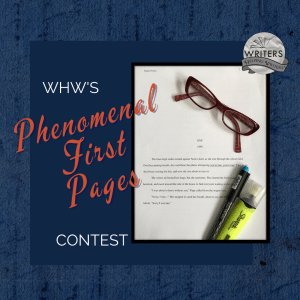 Hey, wonderful writerly people! It���s time for our monthly first-page critique contest
Hey, wonderful writerly people! It���s time for our monthly first-page critique contest 
If you���re working on a first page (in any genre except erotica) and would like some objective feedback, please leave a comment. Any comment :). As long as the email address associated with your WordPress account/comment profile is up-to-date, I���ll be able to contact you if your first page is chosen. Just please know that if I���m unable to get in touch with you through that address, you���ll have to forfeit your win.
Two caveats:
 Please be sure your first page is ready to go so I can critique it before next month���s contest rolls around. If it needs some work and you won���t be able to get it to me right away, let me ask that you plan on entering the next contest, once any necessary tweaking has been taken care of. Resources for common problems writers encounter in their opening pages can be found here.
Please be sure your first page is ready to go so I can critique it before next month���s contest rolls around. If it needs some work and you won���t be able to get it to me right away, let me ask that you plan on entering the next contest, once any necessary tweaking has been taken care of. Resources for common problems writers encounter in their opening pages can be found here.
 This contest only runs for 24 hours, start to finish, so get your comment in there!
This contest only runs for 24 hours, start to finish, so get your comment in there!
Three commenters��� names will be randomly drawn and posted tomorrow morning. If you win, you can email me your first page and I���ll offer my feedback.
We run this contest on a monthly basis, so if you���d like to be notified when the next opportunity comes around, consider subscribing to our blog (see the left-hand sidebar).
Best of luck!
PS: If you want to amp up your first page, grab our helpful checklist on FIRST PAGES at One Stop for Writers.The post Phenomenal First Pages appeared first on WRITERS HELPING WRITERS��.
June 19, 2021
Relationship Thesaurus Entry: Editor and Author
Successful stories are driven by authentic and interesting characters, so it���s important to craft them carefully. But characters don���t usually exist in a vacuum; throughout the course of your story, they���ll live, work, play, and fight with other cast members. Some of those relationships are positive and supportive, pushing the protagonist to positive growth and helping them achieve their goals. Other relationships do exactly the opposite���derailing your character���s confidence and self-worth���or they cause friction and conflict that leads to fallout and disruption. Many relationships hover somewhere in the middle. A balanced story will require a mix of these dynamics.
The purpose of this thesaurus is to encourage you to explore the kinds of relationships that might be good for your story and figure out what each might look like. Think about what a character needs (good and bad), and build a network of connections for him or her that will challenge them, showcase their innermost qualities, and bind readers to their relationship trials and triumphs.
 Editor and Author
Editor and AuthorDescription:
An editor works with an author to strengthen their writing project. The author may privately seek out a freelance editor to improve their writing prior to submitting it to agents and publishing house editors. An editor working for a publishing entity may work with a contracted author on a manuscript that is already complete, for a proposed project that is not yet finished, or in a write-for-hire or ghostwriting capacity. The editor may support them through any number of edits, including copyedits, line edits, developmental edits, and more. The working relationship is built on trust, with an editor who needs to understand the author���s intent and possess the skills to sharpen the writing. The author needs to trust the editor���s judgment and be willing to heed their advice in order to make the suggested revisions. A willingness to compromise and communicate openly is crucial in making this relationship function. But with competing interests and external demands, the editor/author relationship can be a challenging one.
Relationship Dynamics
Below are a wide range of dynamics that may accompany this relationship. Use the ideas that suit your story and work best for your characters to bring about and/or resolve the necessary conflict.
An editor at a publishing house working with an author for the first time
A writer and an editor who are working on a series together
An editor working with an author with whom they have a long-standing, exclusive relationship
A relationship based on mutual trust and respect
An editor working with an author who has difficulty accepting criticism
An editor who takes it personally when suggestions aren’t accepted by the author
A relationship being stymied by a lack of communication or transparency on either side
A relationship between two people who are professional and proper but have personally conflicts
Challenges That Could Threaten The Status Quo
Either party not responding to communication attempts by the other party
The author and editor having a different vision for a project
The editor giving the author harsh, conflicting, or unclear feedback
The author refusing to heed the guidance of the editor
The editor feeling as though the author���s manuscript is not yet ready (despite revision)
The author needing an extension on a deadline
The editor needing a manuscript on a tight deadline
The author feeling as though the editor was too hands-on in their approach
The author not receiving enough feedback for what they paid for a freelance edit
The author wanting to take their project to another editor
The editor (if freelance) raising their rates��
The author submitting revised writing after edits have already started
The editor needing more time to give the author their notes
Either party deciding to pull the book due to controversial content
The editor moving the publication date for the author���s book
One person gossiping about the working relationship and it getting back to the other party
The author���s last project failing to earn out its advance or not receiving attention
A third party, such as the author���s agent or someone in the marketing department, becoming a wedge in the editor-author relationship
The editor realizing the work needed by the author is more than they initially believed
One party facing a major life change (illness, marriage, divorce, childbirth, etc.) that impacts the working relationship��
The author making a very public mistake that requires the editor to sever ties
The editor leaving the author���s contracted publishing house
The editor reducing the budget for publicity, marketing, etc. for the author���s book
The author being pressured by the editor to promote themselves
One party bashing the other party in a public way
The author feeling as though their work is under-appreciated or is seen strictly as a sales commodity
The editor pressuring the author to share more about themselves personally than they feel comfortable doing
The author feeling pressured to take on a project that they do not have interest in
Wounds That Could Factor into The Relationship
A terminal illness diagnosis, A toxic relationship, A traumatic brain injury, An abuse of power, Battling a mental disorder, Being bullied, Being let down by a trusted organization or social system, Cracking under pressure, Growing up in the public eye, Growing up in the shadow of a successful sibling, Having one’s ideas or work stolen, Living with chronic pain or illness, Making a very public mistake, Misplaced loyalty, Prejudice or discrimination, Social difficulties
Conflicting Desires that Can Impair the Relationship
One party wanting to control the other
One party seeing the project as a series and the other seeing it as a stand-alone book
Both parties wanting different levels of communication
An author wanting to stay true to their artistic vision, while the editor must focus on the business side of publication
One party wanting to please gatekeepers (such as parents, librarians, and reviewers), while the other does not��
Having different opinions on time, money, and attention for the project
One party wanting to work together in the future while the other party does not
The author wanting to take their project or writing career elsewhere
The editor and author wanting different illustrators or cover art for the book
The author wanting greater creative license over a project they have been specifically hired to write with the editor���s vision in mind��
Clashing Personality Trait Combinations
Discreet and Gossipy, Independent and Needy, Controlling and Weak-Willed, Efficient and Scatterbrained, Generous and Greedy, Judgmental and Oversensitive, Persuasive and Gullible
Negative Outcomes of Friction
The parties going their separate ways and losing the relationship
The author feeling as though they have no choice but to give control to the editor
The editor having to fire the author
Fights and arguments over proposed edits
Either party feeling undervalued
Either party bad-mouthing the other person in professional circles
The author refusing to pay for services
Fictional��Scenarios That Could Turn These Characters into Allies
A writing project having tremendous success (winning awards, exceeding sales expectations, etc.)
One party experiencing a personal difficulty that the other has experienced
Uniting to stand up to a trolling reviewer or a bully in the marketing department
An editor giving the author the guidance needed to unlock their vision for a project
The author���s project going on to become a TV show or movie
A similar project being worked on by a rival, turning the two parties into a team to produce a better outcome
The two parties joining forces to fight a legal battle against
Ways This Relationship May Lead to Positive Change
The editor and author connecting on a personal level
Both parties learning from each other and wanting to continue working together
A party recognizing what the non-negotiables are in the relationship
The relationship dissolving, and one or both parties finding success with someone who is a better fit
Working together indefinitely, bringing stability to both parties
Learning to collaborate in an otherwise solitary professional environment
An author learning to accept help
An editor learning to respect an author���s vision��
Encouraging an author to bring a project to completion or to take a bold step in their career
Themes and Symbols��That Can Be Explored through This Relationship
A fall from grace, A quest for knowledge, Beginnings, Betrayal, Deception, Depression, Disorder, Endings, Friendship, Greed, Inflexibility, Journeys, Knowledge, Obstacles, Perseverance, Recognition, Sacrifice, Stagnation, Teamwork
Other Relationship Thesaurus entries can be found here.
 Need More Descriptive Help?
Need More Descriptive Help?While this thesaurus is still being developed, the rest of our descriptive collection (15 unique thesauri and growing) is accessible through the One Stop for Writers THESAURUS database.
If you like, swing by and check out the video walkthrough, and then give our Free Trial a spin.
The post Relationship Thesaurus Entry: Editor and Author appeared first on WRITERS HELPING WRITERS��.
June 17, 2021
Building Your Writing Support Triangle, Part 3: Accountability
We’ve loved having Jessica Conoley here the past three weeks to discuss the three vital pieces of support that every author needs. Today, she’s closing out this series by discussing the importance of accountability.
In the past two posts we���ve covered where to turn when you want to improve the quality of your writing with the help of��Critique Support, and how to find motivation and inspiration by finding��Mentors.��It���s time for us to shore up that final leg of your Writing Support Triangle.��The part that helps us get in the day���s words, or edits, or marketing.��
If balancing all of the responsibilities of life, plus our ambitions as a writer, feels impossible and you find yourself doing everything but writing, it���s time to reach out to your Accountability Support.

Accountability is tricky. You have to dig into your personal motivations and fear. Once you understand your motivations, it is a lot easier to find the right accountability tools.
If you highly value other peoples��� opinions, consider a public commitmentDeclare ���I am a writer.��� Publicly. This creates psychological ownership of your writing aspirations. People will ask you what you write, and avoiding the awkward, ���Ummmm, nothing right now������ is great motivation to keep you writing. Work up to telling your friends and family after practicing on a few strangers.Create a newsletter. Decide how often you are going to send out the newsletter (daily, weekly, monthly, quarterly, etc.). Tell people you���re trying an experiment for three months and would they please sign up. Stick to it for one quarter. After three months, if you���ve enjoyed the experience, keep going. You���re creating a direct link to readers, which translates to building your platform. And publishers love to hear you have a platform when you���re shopping that manuscript or book proposal. Post on social media about your writing goal every business day for a month. The internet is always watching. Someone will be inspired by you following your dream. Someone is counting on you to succeed in your writing, because if you can do it, then maybe they can too. Someday, a random stranger may say, ���You inspired me. I just finished my first short story.��� If you hate wasting money, consider a financial commitment Pay to join a class, workshop, or Patreon offered by one of your writing mentors. Classes and workshops provide the opportunity for feedback on your work. Patreon subscriptions let you see behind the scenes of an experienced writer���s career and get you a step closer to your mentor. It���s always beneficial to surround yourself with like-minded writers committed to finishing their work, and these new acquaintances may end up being good accountability partners.Invest in an editor, coach, or therapist. Editors know industry trends; they will dissect books in a way your average critique partner can���t. An edit letter tells you how to move your project forward. A book coach provides accountability and moral support. You may be surprised how much more progress you make when someone is reading over your shoulder. A therapist helps dig into mindset issues that are holding you back. Maybe you thought your problem was a lack of craft or experience, but a therapist might help you realize the real fear that’s holding you back. Reward yourself. If your goal is to write every day for one month, go to the bank and take out thirty dollars in $1 bills. Every day you write, add $1 to a jar. At the end of thirty days take the money out of the jar and treat yourself. Want to make the stakes even higher? If you miss a day, take all the cash out of the jar and start over, from zero, on your next writing day.Financial investment is often a great stepping-stone to other forms of accountability. For my U.S readers, keep track of the amount you invest in your writing career. It���s likely a business investment that you can (and should) write off on your taxes.
If you hate letting other people down, consider a one-on-one commitment Find yourself an accountability partner���an acquaintance whose opinion you value, who is also working toward a goal. Your AP doesn���t have to be a writer, and they don���t have to have the same goal as you. Texting each other daily updates on your individual progress is great motivation. Swap work with a critique partner. CPs are writers you exchange work with and provide feedback for, on a regular basis. Ideally you will find someone at a similar level in their writing career. Agree on a page count, deadline, and frequency of work exchanges. Schedule a co-working session. In the digital era, we can co-work with friends halfway around the world, via video-conferencing. I run two-hour co-working sessions. We chat for fifteen minutes, work for forty-five, chat for fifteen, and work for forth-five. Looking at all the Zoom boxes and knowing other people are working as well is motivating. An added bonus for people with chaotic households is you can say, ���I have a meeting.��� Your family will leave you alone for two hours while you get your words in for the day. Co-working sessions can be a great gateway for people who are transitioning from corporate/work environments with a lot of inherent structure to a free form/self-motivated work environment.
Find yourself an accountability partner���an acquaintance whose opinion you value, who is also working toward a goal. Your AP doesn���t have to be a writer, and they don���t have to have the same goal as you. Texting each other daily updates on your individual progress is great motivation. Swap work with a critique partner. CPs are writers you exchange work with and provide feedback for, on a regular basis. Ideally you will find someone at a similar level in their writing career. Agree on a page count, deadline, and frequency of work exchanges. Schedule a co-working session. In the digital era, we can co-work with friends halfway around the world, via video-conferencing. I run two-hour co-working sessions. We chat for fifteen minutes, work for forty-five, chat for fifteen, and work for forth-five. Looking at all the Zoom boxes and knowing other people are working as well is motivating. An added bonus for people with chaotic households is you can say, ���I have a meeting.��� Your family will leave you alone for two hours while you get your words in for the day. Co-working sessions can be a great gateway for people who are transitioning from corporate/work environments with a lot of inherent structure to a free form/self-motivated work environment. It took me ten years and a lot of experimentation to find the right mix of support, but once I understood my motivations I was able to hone the tools that stuck. If you want to dig into your motivation a little farther, Gretchen Rubin���s four tendencies quiz is a good place to start. The quiz is quick and lets you know if you���re the type who needs internal or external accountability
With a strong writing support triangle, you can move your career forward as you deepen relationships and help others. Taking time to build your Critique, Mentorship, & Accountability triangle now will give you a strong foundation that keeps you in this industry for decades.

Jessica Conoley connects story tellers and tells stories. She writes essays, creative non-fiction, flash fiction, and fantasy. Her coaching services demystify the business aspect of writing by drawing on her past experiences as president of a non-profit and managing editor of a literary magazine. In addition to developmental editorial services, she offers virtual workspaces and critique groups as a way to foster creative community for writers. Learn more at my website or on Twitter.
The post Building Your Writing Support Triangle, Part 3: Accountability appeared first on WRITERS HELPING WRITERS��.
June 15, 2021
8 Ways to Write Your Novel’s Outline

by Lucy V. Hay
How To Write An OutlineWriters who don���t outline are often very loud online. They will say outlines kills creativity. They may even go so far as to claim an outline is a ���straightjacket��� and that writers who use them are ���less interesting���.
The case for outlines ���It���s faster. If you use an outline, you���re much more likely to finish your novel in months (sometimes weeks!), than years. This will also enable you to write more.You won���t get lost. Lots of writers end up blocked and frustrated when drafting without an outline. This in turn gives you confidence.You���re less likely to screw up. Writing is hard, which means we can end up writing ���the wrong stuff��� (whatever that means). Far better to write the wrong stuff in an outline than write many thousands of words you then have to cut altogether or pick apart.Outline = smoother draft generally. Outlines allow you to explore stuff like tropes, genre conventions, storyworld and other thematic elements upfront. This means writers can see what works and what doesn���t, tweaking and refining. So far from being a ���straightjacket��� or ���killing creativity���, it actively ADDS to it.The thing with the outline is you can do it any way you want. Really! It can be as detailed or as loose as you like. You can create your outline using software; you can draw it by hand, or you can use Post-It notes or index cards ��� or a combo of all of these! Check out these tips for more outline approaches ��� good luck!
Write A TreatmentIn the screenwriting world, a treatment is a blow-by-blow account of every event inn your screenplay. Producers will often want these, before they commit to a draft from a screenwriter. They���re usually somewhere between 3 and 10 pages, though you may see longer.
When novelists talk about outlines, they���re usually thinking of treatments. They can be quite dry to write, which is why many writers believe they don���t work. However there are lots of alternatives to the treatment as you will see below. MORE: 5 Questions To Help You Write A Killer Treatment
Story MapsMany writers hate to write outlines ��� so my advice is, DON���T write them! Instead, create what I call a story map.

I like to use post-it notes for this in the first instance, though you can also use index cards. Here in my pic below the various colours refer to various character arcs, though other authors like to colour-code specific plot points. There���s no ���right��� or ���wrong��� way to do it.
Use A WorksheetI created the free B2W Plotting worksheet that takes in various plotting visuals, which you can download HERE. Alternatively, you can DRAW your story map instead freehand if you prefer.
When plotting using a story map, I like to start with the ending, so I can plot backwards and ���find��� my beginning. This means I don���t have to worry about ���info dumps��� at the start of my story.
BONUS TOOL: One Stop for Writers’ Story Map
Use the Three ActsThe three acts refers to the beginning, middle and end of a story ��� nothing more, nothing less! As you will see from the pic below, there are many ���increments��� to the Three Acts that add up to create dramatic satisfaction.
However, there are many other ways to break down The Three Acts, though the most popular and well-used is probably The Hero���s Journey. That plotting archetype has a number of steps writers must use, so using index cards to do this is probably your best bet.
If you want to check out other plotting archetypes to write your outline, I recommend the book The Seven Basic Stories by Christopher Booker.
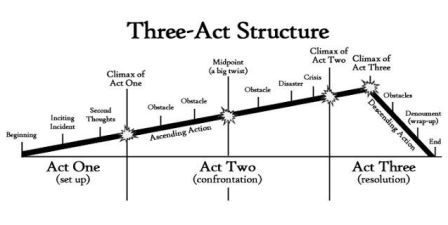 Draft Zero
Draft ZeroSome of my ���Bang2writers��� like to splurge notes and plans in whatever order they like, as it comes to them. This differs from ���pantsing��� because the writer doesn���t just write the book, they may have pictures in there, bullet points, notes to self and various other stuff you would never see in a finished book. One of my writers got to 55K doing this, almost a whole draft! Then he went back and re-arranged, refined, tweaked and filled in chunks of prose.
Freytag���s PyramidFreytag���s Pyramid is a paradigm of dramatic structure outlining the seven key steps in successful storytelling: exposition, inciting incident, rising action, climax, falling action, resolution, and denouement. Those who are familiar with three act structure will note it���s rather similar but adds the notion of ���escalation��� to it. Check out the visual representation below.
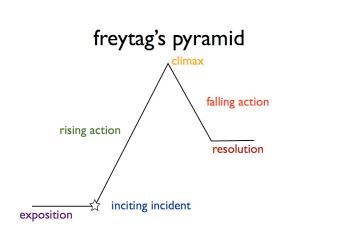 Synopsis
SynopsisEvery book needs a synopsis when it goes out on submission, but some authors like to START with this. It helps focus them, especially as traditional synopses will have details of the beginning, middle and end. However, some writers may prefer to write what B2W calls a One Page Pitch ��� this carries just the beginning and ending. Sometimes this is enough to keep writers focused too. MORE: 10 Quick Tips On Writing A Killer One Pager
The Snowflake MethodI will be honest and say I never really ���got��� what this was until I read this great post from Jericho Writers. In it, they explain how The Snowflake Method breaks down ���
Write your story in one sentenceDecide on your protagonistWrite a paragraph on settingsAdd a beginning, middle and end to your story descriptionWrite short character summariesExpand your story description to 2 pagesKeep adding details until you���re ready to writeThis hit home for me because I recognised I had been doing this all along! In the screenwriting world, writers are often asked to come up with a logline first when drafting. (A logline is basically one sentence describing your story, as per step 1 above). Screenwriters are also expected to doing prep material such as settings, character summaries and some plot details in advance too.
So if you have already written screenplays, The Snowflake Method will probably suit you down to the ground ��� Even if you haven���t, it can still create a great foundation for your novel. MORE: Free Cheat Sheet On How To Write A Logline

Lucy V. Hays
Resident Writing Coach
Lucy is a script editor, author and blogger who helps writers at her site, Bang2write.com. To get free stuff for your novel or screenplay, CLICK HERE.
Twitter �� Facebook �� Instagram
The post 8 Ways to Write Your Novel’s Outline appeared first on WRITERS HELPING WRITERS��.
June 12, 2021
Relationship Thesaurus Entry: Co-Volunteers
Successful stories are driven by authentic and interesting characters, so it���s important to craft them carefully. But characters don���t usually exist in a vacuum; throughout the course of your story, they���ll live, work, play, and fight with other cast members. Some of those relationships are positive and supportive, pushing the protagonist to positive growth and helping them achieve their goals. Other relationships do exactly the opposite���derailing your character���s confidence and self-worth���or they cause friction and conflict that leads to fallout and disruption. Many relationships hover somewhere in the middle. A balanced story will require a mix of these dynamics.
The purpose of this thesaurus is to encourage you to explore the kinds of relationships that might be good for your story and figure out what each might look like. Think about what a character needs (good and bad), and build a network of connections for him or her that will challenge them, showcase their innermost qualities, and bind readers to their relationship trials and triumphs.
 Co-Volunteers
Co-VolunteersDescription
Volunteer work takes many forms. From visiting patients in hospitals to helping prepare materials for victims of natural disasters to teaching one���s native language to second-language learners, and more. Opportunities to give one���s time freely to help those in need are abundant. These opportunities may bring like-minded individuals together, whether by virtue of a shared interest or by sheer chance. But two people who have little in common and clashing personalities may also find themselves volunteering alongside each other. The dynamics of co-volunteers are ripe for character growth and development, as well tension and conflict.
Relationship Dynamics
Below are a wide range of dynamics that may accompany this relationship. Use the ideas that suit your story and work best for your characters to bring about and/or resolve the necessary conflict.
Two people having a passion for or interest in the same cause��
A reluctant friend or family member being pressured to volunteer by a someone they know
Two people being forced to volunteer as part of a school or community-based requirement
A random pair being assigned to the same cause or task
Two people with the same set of skills being tasked to work on a particular committee or need within an organization
One controlling volunteer taking over the role of another
Two volunteers working together to achieve a goal on behalf of an organization
Two people bringing their own unique set of skills to a joint task and learning from one another
A willing volunteer working alongside a demanding volunteer
An apathetic volunteer working alongside an ambitious, passionate volunteer
Challenges That Could Threaten The Status Quo
A volunteer superimposing their own experiences onto the needs of the cause
Identifying corruption within the organization one is helping
Being paired with a volunteer who constantly complains
One party veering into inappropriate territory with a recipient of the organization���s efforts
One volunteer publicly bashing another worker or the organization
Working with someone who recklessly breaks rules, policies, or laws while volunteering
One party feeling as though they are doing all the work
Workers being expected to accept poor working conditions (since they’re volunteers)
One party bowing out of the project, leaving more work for the rest
A disaster resulting from one or both volunteers making a bad decision
Being on the receiving end of anger, bitterness, or rage by someone who does not qualify to receive services from the organization
Being asked to do more work than one agreed to do
Experiencing a traumatic event while volunteering
Being separated from loved ones on a long-term job
A change in the organization’s leadership that impacts those volunteering
Wounds That Could Factor into The Relationship
An abuse of power, Becoming homeless for reasons out of one’s control, Being disowned or shunned, Domestic abuse, Experiencing the death of a parent as a child or youth, Failing to save someone’s life, Growing up in the public eye, Living in a dangerous neighborhood, Living with chronic pain or illness, Prejudice or discrimination, Social difficulties
Conflicting Desires that Can Impair the Relationship
Both parties vying for control of the volunteer efforts
One person wanting to do the best job possible while the other is only there to fulfill a requirement
One person taking advantage of their volunteer status while the other respects the position
Having different visions for the process, services created, or product
One person needing external recognition for their efforts while the other has intrinsic motivation
A willing volunteer being paired with someone who resents being assigned to the role
One person valuing the socialization and companionship of volunteering while the other just wants to complete the project
Clashing Personality Trait Combinations
Courteous and Disrespectful, Discreet and Gossipy, Independent and Needy, Controlling and Weak-Willed, Stingy and Generous, Efficient and Scatterbrained, Judgmental and Oversensitive, Dishonest and Honorable, Mature and Irresponsible, Ambitious and Lazy
Negative Outcomes of Friction
Awkwardness while volunteering��
One person giving up on the project
Someone in need getting overlooked due to distraction and drama between volunteers
A volunteer being asked to exit the organization
Arguments or fights
The volunteer organization’s reputation being sullied
One party taking a submissive role and being mistreated
Friction with volunteer leadership or other volunteers
A negative outlook on the volunteer experience being formed
Fictional��Scenarios That Could Turn These Characters into Allies
Seeing a way to improve upon an organization���s efforts and proposing the change jointly
Identifying a problem or bad actor within the organization and reporting it as a team
Being dissatisfied with an organization���s practices and starting a new foundation
Recognizing a need that falls beyond the organization���s mission and finding a way to satisfy it
Cooperatively coming up with a way to boost fundraising efforts��
Showing a unified front on behalf of the organization
Experiencing shared trauma, whether in the past or while volunteering
Volunteer efforts being sabotaged by a third-party
Coming together to see that an individual or group of people being shunned by the organization receive benefits
Ways This Relationship May Lead to Positive Change
Finding common ground and a meaningful relationship that extends beyond volunteering
One volunteer seeking to become like the other in a positive way
Having a meaningful impact on a common goal
One volunteer learning a skill or gaining knowledge they didn’t have before
A “rogue” volunteer learning the value in working with others
Themes and Symbols��That Can Be Explored through This Relationship
A fall from grace, Alienation, A quest for knowledge, Beginnings, Betrayal, Borders, Coming of age, Crossroads, Danger, Death, Depression, Disorder, Endings, Enslavement, Evil, Family, Freedom, Friendship, Greed, Health, Hope, Illness, Instability, Isolation, Journeys, Knowledge, Loss, Love, Obstacles, Order, Peace, Perseverance, Pride, Rebellion, Recognition, Refuge, Religion, Sacrifice, Suffering, Teamwork, Transformation, Unity, Violence, Vulnerability, Wealth
Other Relationship Thesaurus entries can be found here.
 Need More Descriptive Help?
Need More Descriptive Help?While this thesaurus is still being developed, the rest of our descriptive collection (15 unique thesauri and growing) is accessible through the One Stop for Writers THESAURUS database.
If you like, swing by and check out the video walkthrough, and then give our Free Trial a spin.
The post Relationship Thesaurus Entry: Co-Volunteers appeared first on WRITERS HELPING WRITERS��.
Writers Helping Writers
- Angela Ackerman's profile
- 1014 followers



